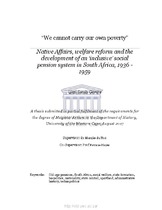| dc.contributor.advisor | du Toit, Marijke|Hayes, Patricia | |
| dc.contributor.author | Gevers, Liezl Sarah | |
| dc.date.accessioned | 2018-03-14T14:02:13Z | |
| dc.date.available | 2018-03-14T14:02:13Z | |
| dc.date.issued | 2017 | |
| dc.identifier.uri | http://hdl.handle.net/11394/5782 | |
| dc.description | Magister Artium - MA (History) | en_US |
| dc.description.abstract | “We cannot carry our own poverty”: Native Affairs, welfare
reform and the development of an ‘inclusive’ social pension
system in South Africa, 1936 – 1959
An ‘inclusive’ system of state social pensions was introduced by the United Party -
led government in 1944 and remained intact throughout apartheid. Scholars have
argued that the delivery infrastructure of the old age pension system in South
Africa – which pervaded National Party rule – became crucial to the rapid
distribution of state social grants in the 1990s. This research focuses on the
construction of a bureaucratic system of control that developed in the 1940s for
the purpose of administering social pensions to black South Africans. Extant
studies on the history of the old age pension system in South Africa have paid
little attention to the politics of administration and the particular ways in which
bureaucrats shaped old age pension policy. In this thesis, I historicise its
development by paying attention to the system’s internal structures and
administration. By focusing on the administration of these pensions in the initial
years of old age pension policy implementation in the Native Affairs Department
(NAD), this thesis examines the position of the old age pension system as one
thread in the reticulation of policies and practices that came together to form the
apartheid state. It elucidates the conjuncture of social assistance, modernising
technologies and centralised registration and administration in the 1950s,
outside of any grand plan, as a factor in what became one of the apartheid state’s
insidious projects of social engineering and control: separate development. I
argue that the shift in administrative practice that occurred toward the end of the
1940s (but before National Party rule) from a decentralised, manual system of
administration to a centralised, mechanised one reined in the authority of local
authorising officers and limited their previously-held ability to act as mediators
in the administration and development of the system, shifting their roles from
active mediators to passive intermediaries. The technologies introduced with the
project of mechanisation enabled the National Party led-NAD to embark on a
campaign to systematically review and limit the award of pensions to black South
African while keeping intact a system that was politically, socially and
economically expedient. In this thesis, I contend that the system of old age
pensions bolstered the dominant economic and political structures in South
Africa and suggest that this system played a significant role in enabling the
persistence of these structures. | |
| dc.language.iso | en | en_US |
| dc.publisher | The University of the Western Cape | en_US |
| dc.title | We cannot carry our own poverty: Native Affairs, welfare reform and the development of an 'inclusive' social pension system in South Africa, 1936 - 1959 | en_US |
| dc.rights.holder | The University of the Western Cape | en_US |

